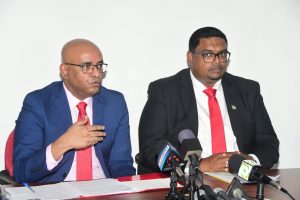PPP leaders support public release of Govt., oil companies’ email correspondence
The leaders of the People’s Progressive Party (PPP) are in support of calls to publish details, particularly email correspondence between Government and officials and the six companies that were selected to bid to handle for the sale of Guyana’s Liza crude.
A press conference was held at the Office of the Leader of the Opposition on Church Street yesterday, where Opposition Leader Bharrat Jagdeo and PPP Presidential Candidate Mohamed Irfaan Ali fielded questions from Kaieteur News on the issue.
Jagdeo made it clear that he would support the release of the emails, and said he had received word early on, that some oil companies were invited to bid face-to-face. Those turned out to be ExxonMobil, Hess Corporation, CNOOC/NEXEN, British Petroleum, Chevron, Shell, Total, and ENI.
“Obviously, they were contacted through email… So therefore, it could set up a trail of whether the process was skewed in favour of the bidder who won.”
He said that he’s not sure what kind of process the Government sought to utilize, and he is calling for complete transparency.
Qualifying his statements, Jagdeo added “If the process was open and transparent, I would not [have called for the emails to be released].”
Appropriately, he believes that the process should have been an open public tender, with a timeline given in advance in newspaper advertisements.
“But knowing them, they will not publish the emails,” Jagdeo concluded.
Ali, explaining the need for complete transparency, said “Before you get to an award, there must be a process. And we have already expressed concern about the process.”
He noted that there is a lack of information, and secrecy surrounding the process for the sale of Guyana’s oil.
Then, he spoke of the necessity for the public to scrutinize what the Department of Energy had intended to keep silent on, until it had concluded the entire process.
“If you have a process that is not transparent… then you will have issues,” Ali said.
The Energy Department has announced that it will be taking steps to ensure citizens are able to access records on the sale. But there are concerns about how exactly the process went down. The Energy Department had held a hasty press conference after the public found out about the sale through a Bloomberg report, giving each reporter limited chances to pose questions. By the end of the press conference, there were more questions than answers.
Insecurity over the secrecy of the negotiations is compounded by the fact that the company Government has chosen to sign with is embroiled in what is being described as the World’s biggest corruption scandal.
International Non-Governmental Organisation, Global Witness, had revealed Shell’s involvement in a vast bribery scheme so that it could obtain the rights to operate in a lucrative oil block called OPL 245, off the coast of Nigeria.
In 2011, Global Witness reported that Shell and Italian Oil Company Eni (who was also selected by the Energy Department to bid) paid over US$1.1 billion in a murky deal for the block.
Following a lengthy investigation, the NGO showed that the money for the rights to exploit the country’s natural resources went to convicted money launderer and former Nigerian oil Minister, Dan Etete, who had awarded himself ownership of the block in 1998 via a company he secretly owned, Malabu Oil and Gas.
Global Witness said that for six years, Shell has denied it did anything wrong, and said it only paid the Nigerian government in securing rights to the block. But it was revealed that Shell executives knew the money would go to Malabu and Etete, and was then likely to flow to some of the most powerful people in the country.
Global Witness stated that the money paid for the block equals more than the African nation’s 2016 health care budget. It is also one and a half times what the United Nations says is now needed to respond to the current famine crisis. Research indicates that approximately 8.5 million people in Nigeria are in need of humanitarian assistance while 5.1 million Nigerians are malnourished.
The deal which allegedly paved the way for billions to be siphoned off to agents and middlemen in corrupt payments has also sparked law enforcement inquiries in six other countries.






















